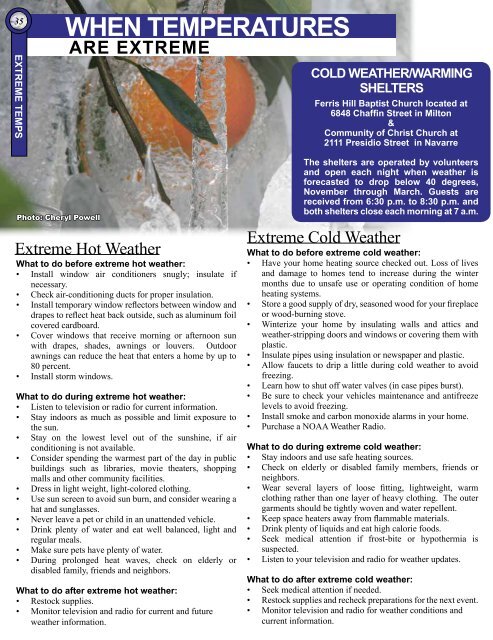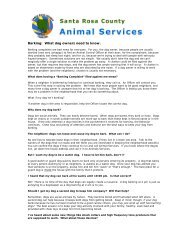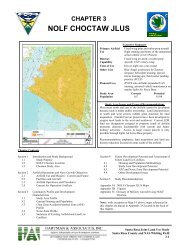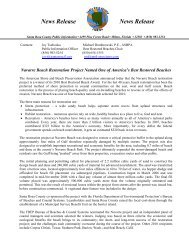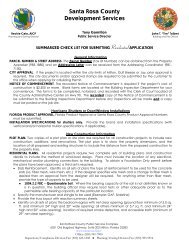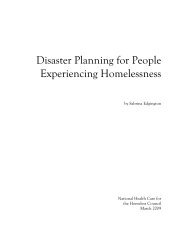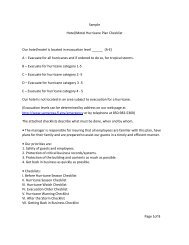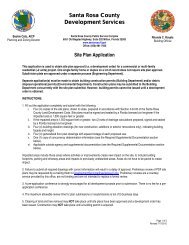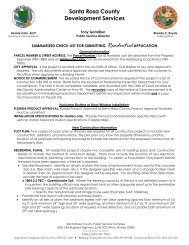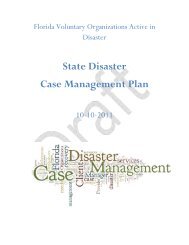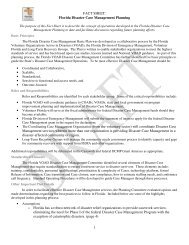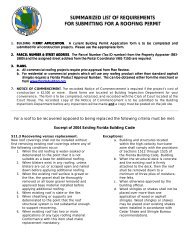Disaster - Santa Rosa County
Disaster - Santa Rosa County
Disaster - Santa Rosa County
Create successful ePaper yourself
Turn your PDF publications into a flip-book with our unique Google optimized e-Paper software.
35<br />
Extreme Temps<br />
When temperatures<br />
Are Extreme<br />
Cold Weather/Warming<br />
Shelters<br />
Ferris Hill Baptist Church located at<br />
6848 Chaffin Street in Milton<br />
&<br />
Community of Christ Church at<br />
2111 Presidio Street in Navarre<br />
Photo: Cheryl Powell<br />
Extreme Hot Weather<br />
What to do before extreme hot weather:<br />
• Install window air conditioners snugly; insulate if<br />
necessary.<br />
• Check air-conditioning ducts for proper insulation.<br />
• Install temporary window reflectors between window and<br />
drapes to reflect heat back outside, such as aluminum foil<br />
covered cardboard.<br />
• Cover windows that receive morning or afternoon sun<br />
with drapes, shades, awnings or louvers. Outdoor<br />
awnings can reduce the heat that enters a home by up to<br />
80 percent.<br />
• Install storm windows.<br />
What to do during extreme hot weather:<br />
• Listen to television or radio for current information.<br />
• Stay indoors as much as possible and limit exposure to<br />
the sun.<br />
• Stay on the lowest level out of the sunshine, if air<br />
conditioning is not available.<br />
• Consider spending the warmest part of the day in public<br />
buildings such as libraries, movie theaters, shopping<br />
malls and other community facilities.<br />
• Dress in light weight, light-colored clothing.<br />
• Use sun screen to avoid sun burn, and consider wearing a<br />
hat and sunglasses.<br />
• Never leave a pet or child in an unattended vehicle.<br />
• Drink plenty of water and eat well balanced, light and<br />
regular meals.<br />
• Make sure pets have plenty of water.<br />
• During prolonged heat waves, check on elderly or<br />
disabled family, friends and neighbors.<br />
What to do after extreme hot weather:<br />
• Restock supplies.<br />
• Monitor television and radio for current and future<br />
weather information.<br />
The shelters are operated by volunteers<br />
and open each night when weather is<br />
forecasted to drop below 40 degrees,<br />
November through March. Guests are<br />
received from 6:30 p.m. to 8:30 p.m. and<br />
both shelters close each morning at 7 a.m.<br />
Extreme Cold Weather<br />
What to do before extreme cold weather:<br />
• Have your home heating source checked out. Loss of lives<br />
and damage to homes tend to increase during the winter<br />
months due to unsafe use or operating condition of home<br />
heating systems.<br />
• Store a good supply of dry, seasoned wood for your fireplace<br />
or wood-burning stove.<br />
• Winterize your home by insulating walls and attics and<br />
weather-stripping doors and windows or covering them with<br />
plastic.<br />
• Insulate pipes using insulation or newspaper and plastic.<br />
• Allow faucets to drip a little during cold weather to avoid<br />
freezing.<br />
• Learn how to shut off water valves (in case pipes burst).<br />
• Be sure to check your vehicles maintenance and antifreeze<br />
levels to avoid freezing.<br />
• Install smoke and carbon monoxide alarms in your home.<br />
• Purchase a NOAA Weather Radio.<br />
What to do during extreme cold weather:<br />
• Stay indoors and use safe heating sources.<br />
• Check on elderly or disabled family members, friends or<br />
neighbors.<br />
• Wear several layers of loose fitting, lightweight, warm<br />
clothing rather than one layer of heavy clothing. The outer<br />
garments should be tightly woven and water repellent.<br />
• Keep space heaters away from flammable materials.<br />
• Drink plenty of liquids and eat high calorie foods.<br />
• Seek medical attention if frost-bite or hypothermia is<br />
suspected.<br />
• Listen to your television and radio for weather updates.<br />
What to do after extreme cold weather:<br />
• Seek medical attention if needed.<br />
• Restock supplies and recheck preparations for the next event.<br />
• Monitor television and radio for weather conditions and<br />
current information.


